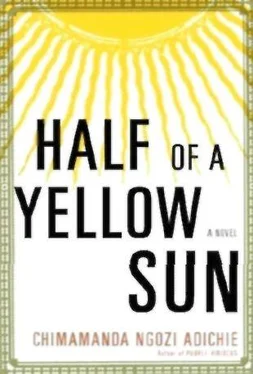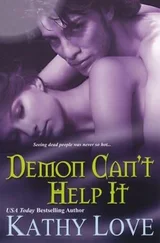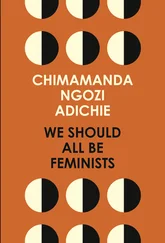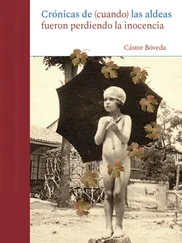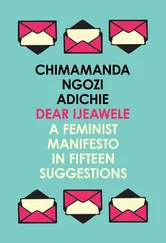When she first saw her parents, her father called her "Ola m," my gold, and she wished he wouldn't because she felt tarnished.
"I did not even see Kainene before she left. When I woke up, she was gone," she said to them.
"Anyiga-achotaya, we will find her," her mother said.
"We will find her," her father repeated.
"Yes, we will find her," Olanna said too, and she felt as if they were all scratching desperate fingernails on a hard scarred wall. They told one another stories of people who had been found, who had come back after months of being lost. They did not tell one another the other stories, of those still missing, of families burying empty caskets.
The two soldiers who had come and eaten her jollqf 'rice filled her with rage. She lay on the living room floor and prayed that they would not find her Biafran pounds. After they left, she took the folded notes out from the envelope hidden in her shoe and went out and lit a match under the lemon tree. Odenigbo watched her. He disapproved, she knew, because he kept his flag folded inside the pocket of a pair of trousers.
"You're burning memory," he told her.
"I am not." She would not place her memory on things that strangers could barge in and take away. "My memory is inside me."
The weeks passed and the water started running again and the butterflies were back in the front yard and Baby's hair grew jet-black. Boxes of books came for Odenigbo from overseas. For a war-robbed colleague, the notes read, from fellow admirers of David Blackwell in the brotherhood of mathematicians. Odenigbo spent days poring over them. "Look, I had the first edition of this one," he said often.
Edna sent books and clothes and chocolate. Olanna looked at the enclosed pictures and Edna looked foreign, a woman who lived in Boston and had greasy-pressed hair. It seemed very long since Edna had lived next door to her flat on Elias Avenue, and it seemed even longer since this yard on Odim Street had formed the boundaries of her life. When she took long walks on campus, past the tennis courts and Freedom Square, she thought how quick leaving had been and how slow returning was.
Her bank account in Lagos was gone. It no longer existed. It was like being forcibly undressed; somebody had snatched at all her clothes and left her shivering naked in the cold. But she saw a good sign there. Since she had lost her savings, then she could not possibly lose her sister too; the custodians of fate were not that wicked.
"Why is Aunty Kainene still at qfia attack?" Baby asked often, with a steady suspicious look.
"Stop asking me, this child!" Olanna said. But she saw a sign in Baby's questions too, although she could not yet decipher its meaning. Odenigbo told her that she had to stop seeing signs in everything. She was angry that he could disagree with her seeing signs of Kainene's return and then she was grateful that he did, because it meant he did not believe that anything had happened that would make his disagreeing inappropriate.
When some relatives came from Umunnachi and suggested that they consult a dibia, Olanna asked her Uncle Osita to go. She gave him a bottle of whisky and some money to buy a goat for the oracle. She drove to the River Niger to throw in a copy of Kainene's photo. She went to Kainene's house in Orlu and walked around it three times. And she waited for the week that the dibia had stipulated, but Kainene did not come home.
"Maybe I didn't do something right," she told Odenigbo. They were in his study. The floor was littered with blackened paper crisps from the pages of his half-burned books.
"The war has ended but hunger has not, nkem. That dibia was just hungry for goat meat. You can't believe in that."
"I do believe in it. I believe in everything. I believe in anything that will bring my sister home." She stood up and went to the window.
"We come back again," she said.
"What?"
"Our people say that we all reincarnate, don't they?" she said. " Uwa m, uwa ozo. When I come back in my next life, Kainene will be my sister."
She had started to cry softly. Odenigbo took her in his arms.
8. The Book: The World Was Silent When We Died
Ugwu writes his dedication last: For Master, my good man.
This book is based on the Nigeria-Biafra War of 1967-70 but I have taken many liberties for the purposes of fiction; my intent is to portray my own imaginative truths and not the facts of the war. While some of the characters are based on actual persons, their portrayals are fictitious as are the events surrounding them. I have listed below the books (most use the anglicized spelling Ibo for Igbo) that helped in my research. I owe much thanks to their authors. In particular, Chuk-wuemeka Ike's Sunset at Dawn and Flora Nwapa's Never Again were indispensable in creating the mood of middle-class Biafra; Christopher Okigbo's own life and Labyrinths inspired the character of Okeoma; while Alexander Madiebo's The Nigerian Revolution and the Biafran War was central to the character of Colonel Madu.
However, I could not have written this book without my parents. My wise and wonderful father, Professor Nwoye James Adichie, Odelu Ora Abba, ended his many stories with the words agha ajoka, which in my literal translation is "war is very ugly." He and my defending and devoted mother, Mrs. Ifeoma Grace Adichie, have always wanted me to know, I think, that what matters is not what they went through but that they survived. I am grateful to them for their stories and for so much more.
I salute my Uncle Mai, Michael E. N. Adichie, who was wounded while fighting with the 21st Battalion of the Biafran Army, and who spoke to me of his experience with much grace and humor. I salute, also, the sparkling memories of my Uncle CY (Cyprian Odigwe, 1949-98) who fought with the Biafran Commandos, my cousin Pauly (Paulinus Ofili, 1955–2005) who shared his memories of life in Biafra as a thirteen-year-old, and my friend Okla (Okoloma Maduewesi, 1972–2005) who will now not clutch this under his arm as he did the last.
Thanks to my family: Toks Oremule and Arinze Maduka, Chisom and Amaka Sonny-Afoekelu, Chinedum and Kamsi Adichie, Ijeoma and Obinna Maduka, Uche and Sonny Afoekelu, Chukwunwike and Tinuke Adichie, Nneka Adichie Okeke, Okechukwu Adichie, and especially Kenechukwu Adichie; all the Odigwes of Umunnachi and the Adichies of Abba; my "sisters" Urenna Egonu and Uju Egonu, and my "baby bro," Oji Kanu, for believing I am better than I am.
Thanks to Ivara Esege; to Jason Cowley for reading and rereading; to Binyavanga Wainaina for his excellent complaints; to Amaechi Awurum for teaching me about faith; to Ike Anya, Muhtar Bakare, Maren Chumley, Laura Bramon Good, Martin Kenyon, and Ifeacho Nwokolo for being draft-reading friends; to Susan Buchan for those photographs taken in Biafra; to the Vermont Studio Center for the gift of space and time; and to Professor Michael J. C. Echeruo, whose erudite and generous comments made me search for the other half of the sun.
I am grateful to my inimitable agent Sarah Chalfant for making me feel safe; and to Mitzi Angel, Anjali Singh, and Robin Desser, my brilliantly discerning editors.
May we always remember.
